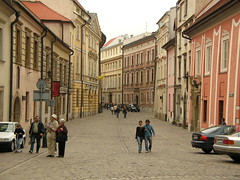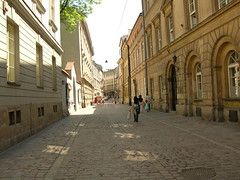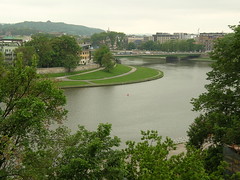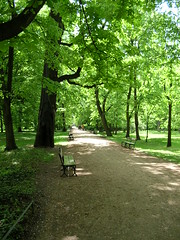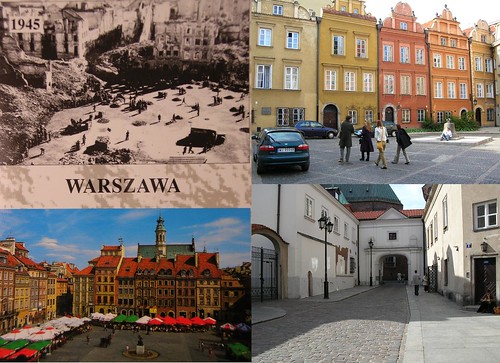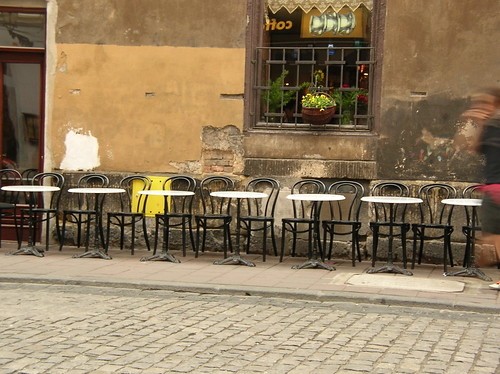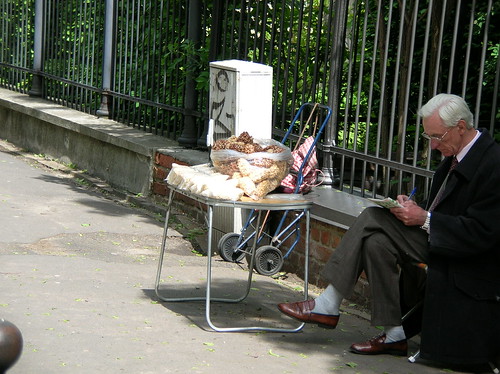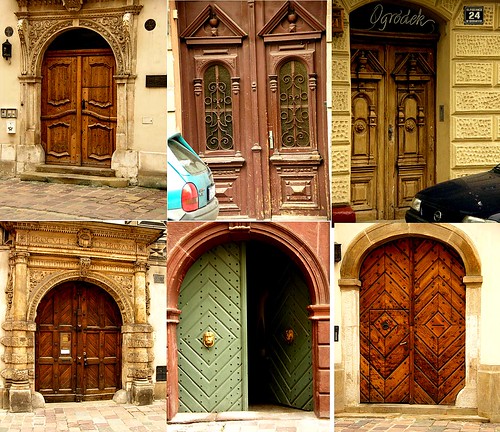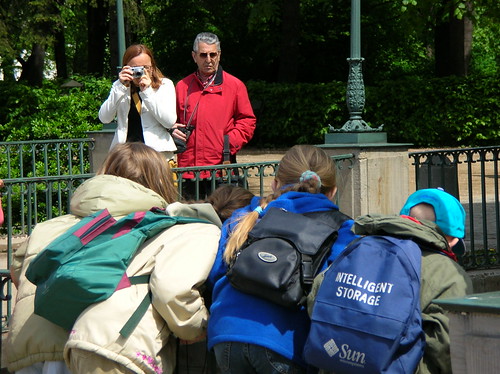Wednesday, June 29, 2005
Ten things about Poland
Hey, here's a great idea for a meme: your ten most notable impressions of Poland! Me first:
1. Subtle beauty. Poland is like the midwest of Europe: a “flyover” country whose beauty and interesting qualities are easy to miss, but are there for those who care to look for it. Both Warsaw and Krakow are vibrant cities, in very contrasting ways. Warsaw has big city buzz, a thriving arts scene, urban edge. Krakow is a beautiful medieval city filled with Polish and international students: one part tourist eye candy, one part college town. The Polish countryside, with its rolling pastoral landscapes, is quite lovely. And I didn’t even make it down to the gorgeous Carpathian mountains. (See Nina's pics, here and here.)
2. Food. Travel in Poland is something of a bargain. Food costs about half of what it does in the U.S., and you can eat very well. You can get very good European-style coffee everywhere, and – who’d have thunk it? – Polish chocolate is as good as any I’ve had in Europe. Again, see Nina's pics. (Go here and just scroll and scroll.) (This was my plate, I think.) Sorry to be a broken record, but Nina may be the best food photo-blogger in the world.
3. Getting around. For a tourist, it’s surpisingly easy to get around. In Warsaw and Krakow, most Poles speak some English, and many speak English quite well – though if you ask them, they always modestly claim that they can speak only a little English. Ironically, those who speak the least English seem to be the folks who work the infrastructure – train stations, buses, the post office, even the tourist information booths. (Perhaps because these are public sector jobs?)
4. Transportation. Although the public transportation – buses and streetcars – seemed plentiful, we didn’t make the effort to figure out how to use them because the cities were very walkable and the taxis inexpensive. A few times, it seemed as though the taxi driver was purposely overcharging us, but why fight over what amounted to about a dollar or two?
5. Eyedar issues. I got busted by eyedar many times: The women in Poland, to make a gross generalization, are strikingly good-looking. The men, apparently, not so much. This latter impression was gleaned from two facts. First, B complained about the lack of good scoping. Second, I seemed to be getting checked out by women a lot, which never happens to me back home. Though perhaps I was getting geek-checked due to the camera hanging around my neck.
6. Ambivalence. Maybe Poland’s complex and interesting history of partitioning, being erased from the map and re-established, of shifting borders that now include swaths of former German and Ukrainian territory, of being dragged into communism and then transitioning back into capitalism, has made an impression on the Polish psyche – why shouldn’t it?
I experienced this in the form of a strong impression of Poles’ ambivalence toward foreign tourists. I’m not one of these monied travelers who looks for obsequious smiles and ingratiating service, but I tend to be friendly in day-to-day encounters and to look for the same in return. More often than not, the people I dealt with were brusque and unsmiling. The advice I got that Poles “really appreciate it” when you make an effort to approach them initially with a phrase in Polish (I got good at saying “do you speak English” in Polish) or to thank them with a “dzienkuje” worked maybe a third of the time.
Things were different when we were with Nina. I don’t know whether it was her fluent Polish, or her great personal charm, but we almost invariably got spillover friendliness from people with Nina as our guide. At our hotel in Krakow, where we checked in a day ahead of Nina, the desk clerks gave us a substantial room upgrade the day after we exchanged big hugs with Nina in front of them in the hotel lobby.
7. Getting stared at. Poles – particularly Polish men – are big starers. I’m not talking about now about checking out the eye candy. Just staring. If they think there’s something unusual about you, or if you look different – i.e., like a tourist, or not Polish – Poles seem to think nothing about gawking right at you. Several times, it wasn’t just gawking, it was glaring. You really know you’ve been stared at when you get the evil eye from a 20-something Polish skinhead on a commuter train to the countryside for half an hour straight. If you look at them in the eye, the starer will look away. But it can get uncomfortable.
8. Diversity. Poland doesn't have the history of colonialism that has produced a lot of the ethnic diversity seen in many western European countries. Today, Poland has minimal ethnic diversity. On the Warsaw subway during rush hour, my impression was “never have I been so crammed into a subway car with so many white people.”
9. “Excuse me.” When traveling in a foreign country where I don’t know the language, I think it’s important to learn a few phrases, one of which should always be “excuse me.” It’s inevitable that you will bump into people or have to squeeze past them, and I certainly don’t like being jostled without some sort of slightly apologetic acknowledgment. In Poland, the phrase (pronounced psheh-pra-shem) means “excuse me” in both English senses: “I beg your pardon” and “may I have your attention for a moment?” and is thus a very useful word.
I found it useful in the first sense, but not the second. I was jostled in Poland as much as in New York City, at least once a day. Not a big deal. Never did anyone say excuse me -- not once! -- but to their credit, the Poles are fair about this: no one gave me an angry look for jostling them or gave any indication that I was to say “excuse me” to them.
10. Conclusion: Go to Poland. Okay, so I could have done without the staring and the brusqueness, but come on: would you skip going to New York City because people are rude, the streets are dirty, and it has had high crime rates in the past? Would you miss Paris because many shopkeepers, hotel desk clerks and bus driver will give you lots of attitude? Every place you could visit has some imperfections, but Poland’s minuses are heavily outweighed by its pluses. We had a wonderful eight days there.
And if you possibly can, go to Poland with Nina.
***
Randomly-selected streets, Krakow. [Warning: photos in this
post do not necessarily match the text!]
post do not necessarily match the text!]
1. Subtle beauty. Poland is like the midwest of Europe: a “flyover” country whose beauty and interesting qualities are easy to miss, but are there for those who care to look for it. Both Warsaw and Krakow are vibrant cities, in very contrasting ways. Warsaw has big city buzz, a thriving arts scene, urban edge. Krakow is a beautiful medieval city filled with Polish and international students: one part tourist eye candy, one part college town. The Polish countryside, with its rolling pastoral landscapes, is quite lovely. And I didn’t even make it down to the gorgeous Carpathian mountains. (See Nina's pics, here and here.)
The Vistula River winds through both Krakow (here) and Warsaw.
Neo-classical building facades, Krakow.
2. Food. Travel in Poland is something of a bargain. Food costs about half of what it does in the U.S., and you can eat very well. You can get very good European-style coffee everywhere, and – who’d have thunk it? – Polish chocolate is as good as any I’ve had in Europe. Again, see Nina's pics. (Go here and just scroll and scroll.) (This was my plate, I think.) Sorry to be a broken record, but Nina may be the best food photo-blogger in the world.
3. Getting around. For a tourist, it’s surpisingly easy to get around. In Warsaw and Krakow, most Poles speak some English, and many speak English quite well – though if you ask them, they always modestly claim that they can speak only a little English. Ironically, those who speak the least English seem to be the folks who work the infrastructure – train stations, buses, the post office, even the tourist information booths. (Perhaps because these are public sector jobs?)
Lazienki Park, Warsaw.
4. Transportation. Although the public transportation – buses and streetcars – seemed plentiful, we didn’t make the effort to figure out how to use them because the cities were very walkable and the taxis inexpensive. A few times, it seemed as though the taxi driver was purposely overcharging us, but why fight over what amounted to about a dollar or two?
The Poles painstakingly restored Warsaw's Old Town after its destruction
by the Germans in the Warsaw Uprising of 1944.
by the Germans in the Warsaw Uprising of 1944.
5. Eyedar issues. I got busted by eyedar many times: The women in Poland, to make a gross generalization, are strikingly good-looking. The men, apparently, not so much. This latter impression was gleaned from two facts. First, B complained about the lack of good scoping. Second, I seemed to be getting checked out by women a lot, which never happens to me back home. Though perhaps I was getting geek-checked due to the camera hanging around my neck.
6. Ambivalence. Maybe Poland’s complex and interesting history of partitioning, being erased from the map and re-established, of shifting borders that now include swaths of former German and Ukrainian territory, of being dragged into communism and then transitioning back into capitalism, has made an impression on the Polish psyche – why shouldn’t it?
I experienced this in the form of a strong impression of Poles’ ambivalence toward foreign tourists. I’m not one of these monied travelers who looks for obsequious smiles and ingratiating service, but I tend to be friendly in day-to-day encounters and to look for the same in return. More often than not, the people I dealt with were brusque and unsmiling. The advice I got that Poles “really appreciate it” when you make an effort to approach them initially with a phrase in Polish (I got good at saying “do you speak English” in Polish) or to thank them with a “dzienkuje” worked maybe a third of the time.
Things were different when we were with Nina. I don’t know whether it was her fluent Polish, or her great personal charm, but we almost invariably got spillover friendliness from people with Nina as our guide. At our hotel in Krakow, where we checked in a day ahead of Nina, the desk clerks gave us a substantial room upgrade the day after we exchanged big hugs with Nina in front of them in the hotel lobby.
Old-world sidewalk cafe across the street from the modish "Coffee Republic," Krakow.
7. Getting stared at. Poles – particularly Polish men – are big starers. I’m not talking about now about checking out the eye candy. Just staring. If they think there’s something unusual about you, or if you look different – i.e., like a tourist, or not Polish – Poles seem to think nothing about gawking right at you. Several times, it wasn’t just gawking, it was glaring. You really know you’ve been stared at when you get the evil eye from a 20-something Polish skinhead on a commuter train to the countryside for half an hour straight. If you look at them in the eye, the starer will look away. But it can get uncomfortable.
8. Diversity. Poland doesn't have the history of colonialism that has produced a lot of the ethnic diversity seen in many western European countries. Today, Poland has minimal ethnic diversity. On the Warsaw subway during rush hour, my impression was “never have I been so crammed into a subway car with so many white people.”
Man selling pistachio nuts, outside Lazienki Park, Warsaw.
9. “Excuse me.” When traveling in a foreign country where I don’t know the language, I think it’s important to learn a few phrases, one of which should always be “excuse me.” It’s inevitable that you will bump into people or have to squeeze past them, and I certainly don’t like being jostled without some sort of slightly apologetic acknowledgment. In Poland, the phrase (pronounced psheh-pra-shem) means “excuse me” in both English senses: “I beg your pardon” and “may I have your attention for a moment?” and is thus a very useful word.
I found it useful in the first sense, but not the second. I was jostled in Poland as much as in New York City, at least once a day. Not a big deal. Never did anyone say excuse me -- not once! -- but to their credit, the Poles are fair about this: no one gave me an angry look for jostling them or gave any indication that I was to say “excuse me” to them.
Krakow doorways.
10. Conclusion: Go to Poland. Okay, so I could have done without the staring and the brusqueness, but come on: would you skip going to New York City because people are rude, the streets are dirty, and it has had high crime rates in the past? Would you miss Paris because many shopkeepers, hotel desk clerks and bus driver will give you lots of attitude? Every place you could visit has some imperfections, but Poland’s minuses are heavily outweighed by its pluses. We had a wonderful eight days there.
And if you possibly can, go to Poland with Nina.
By the way, if you've liked the photo-travel-blogging on these pages, you should know that
Nina continually inspired and challenged me to have my camera with me at all times.
Nina continually inspired and challenged me to have my camera with me at all times.
***
Comments:
<< Home
That is a magnificent post! Thank you, Oscar.
People should have a chance to travel with you. You pack each day full with contemplative moments, allowing the details to sink in. Not for you the crude observations, the pat responses. You notice things! And you listen. A lot. No wonder you then write these terrific posts.
People should have a chance to travel with you. You pack each day full with contemplative moments, allowing the details to sink in. Not for you the crude observations, the pat responses. You notice things! And you listen. A lot. No wonder you then write these terrific posts.
I have emailed Nina and told her that I feel as if I have traveled Poland through her blog. Now with yourcomplementary blog I have further traveled in Poland
Bert
Post a Comment
Bert
Subscribe to Post Comments [Atom]
<< Home
Subscribe to Comments [Atom]
